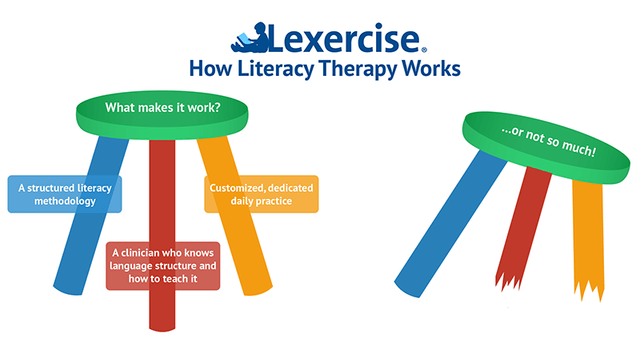The Importance of Structured Literacy
Twenty percent of school-aged children have dyslexia. Unfortunately, this disorder often goes unidentified, misdiagnosed, or even ignored by the public school system. As a result, too many children are not getting the education they need. In order for these children to reach their full potential, science has shown that early intervention is necessary. For the intervention to be effective, three elements are necessary. These three elements are shown in the analogy of the “three-legged stool”. If one of the legs is missing or short, the stool will fall over (i.e., the intervention won’t work effectively).

The Three Elements Necessary for Structured Literacy to Succeed
1. A Structured Literacy Curriculum
To gain proficiency in reading, spelling, and writing students need to be taught with a program that is scientifically backed. The structured literacy (AKA, Orton-Gillingham) approach is supported by more than three decades of research from The National Institutes of Health making it “the gold standard” in teaching students to read and spell. It is not only the most effective method for students who are struggling with reading words and spelling them, but it is the most effective method for teaching the foundations of literacy to all students.
2. A Teacher
The English spelling system is very regular but in complex ways, so the teacher or therapist using a structured literacy curriculum must be prepared to explain why English words are pronounced and spelled as they are. A good curriculum will help here as it will lay out the information in a clear, logical, and cumulative way. But a curriculum can’t do the actual teaching! That requires a caring, supportive, and organized adult who can engage the student in both lessons and practice. Attention is essential for all learning and a teacher is often the key to engaging attention!
For professionals who want to be certified in the application of structured literacy methods, the International Dyslexia Association (IDA) has Knowledge & Practice Standards and accredited professional development programs. Professional development programs that have earned IDA’s Accreditation-PLUS prepare professionals to work one-on-one with students who have complex language processing difficulties.
3. Deliberate, Daily Practice
Practice with error-correction feedback is essential for developing skills and retaining concepts. Ideally, skill practice should be focused on concepts taught in the lesson. It should be brief and daily. Practice data should be used to gauge student progress.
How the Lexercise Structured Literacy Curriculum™ Works
With three solid “legs” on the “stool”, significant progress can be achieved in a matter of months. The Lexercise Structured Literacy Curriculum™ is a blended learning model, combining face-to-face lessons with a caring adult and online games for deliberate, daily practice.
In Lexercise Professional Therapy, a trained therapist customizes the Lexercise Structured Literacy Curriculum™ to fit a student’s specific learning needs. Most students make dramatic gains with this approach. As a result, for Professional Therapy students, Lexercise is able to guarantee a grade level increase in reading abilities after 2 months of therapy, or your third month is free.
In Lexercise Basic Therapy the Lexercise Structured Literacy Curriculum™ is available for parents to use at home, without the direct involvement of a Lexercise therapist.
In Lexercise for Schools, the same curriculum is available for use in schools.
If you have any questions about our program or would like to get in touch, you can contact us on this page.
2 Responses to The Importance of Structured Literacy
Leave a comment
Improve Your Child’s Reading
Learn more about Lexercise today.
15-minute consultation
Taylor Quinn
Blog & PR Intern
Taylor is a senior studying communication at NC State University. As the Blog and PR intern for lexercise she utilizes her passion for writing to help inform parents of struggling readers, writers and spellers. She feels a connection to Lexercise through her love for children and their well-being.


I have a four year old nephew is have trouble reading writhing and hearing sounds